17 May 1943, Warsaw – 3 November 2021, Taillet, France
Biography

Joanna Bruzdowicz comes from a musical family: her father was an architect and cellist, her mother a pianist. Bruzdowicz started her musical career as a child prodigy when she began to compose at the age of six. Interestingly, she later dedicated much of her efforts to promoting music for the youth.
She studied at the Warsaw Music High School, at the State Higher School of Music (composition with Kazimierz Sikorski and piano with Irena Protasewicz and Wanda Łosakiewicz), earning her M.A. in 1966. She traveled to Paris to continue her studies on a scholarship from the French government and became a student of Nadia Boulanger, Oliver Messiaen and Pierre Schaeffer (1968-70). While in Paris, she joined the electro-acoustic Groupe de Recherches Musicales and wrote her doctoral thesis Mathematics and Logic in Contemporary Music at the Sorbonne. After completing her studies in France, she settled in Belgium and established herself as a composer there before resettling permanently in southern France.
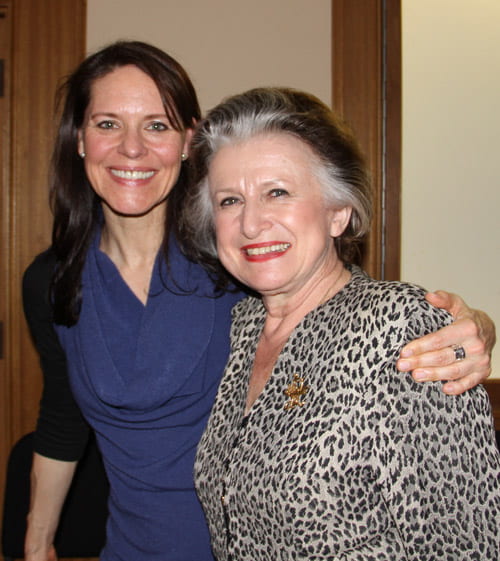
Alongside Grażyna Bacewicz, Anna Maria Klechniowska, Bernardetta Matuszczak, Barbara Niewiadomska and Marta Ptaszyńska, Bruzdowicz was one of several Polish women studying with Nadia Boulanger. Boulanger’s advice was very firm and non-compromising: she insisted that composers have no right to self-pity or self-indulgence, but solely the right to work, work, work. This principle was internalized by her most talented students, such as Bacewicz, Bruzdowicz or Ptaszyńska, and expressed in their intensely focused work habits that resulted in the high volume and quality of their output.
As a composer Bruzdowicz devoted her attention to opera, symphonic and chamber music, works for children, and music for film and television. She wrote a number of concerti and chamber pieces, as well as over 25 hours of film music. Her compositions are featured on 12 CDs and over 20 LPs; she has been featured in TV programs produced in Belgium, France, Germany and Poland. Bruzdowicz’s music has been praised for its “poetic palette of sound” and its qualities of being “ultramodern and refined” while remaining expressive and personal. Her output includes several operas which brought to the stage some of the greatest works of European literature, including The Penal Colony, after Kafka, 1972; The Women of Troy after Euripides, 1973; and The Gates of Paradise, after Jerzy Andrzejewski, 1987.
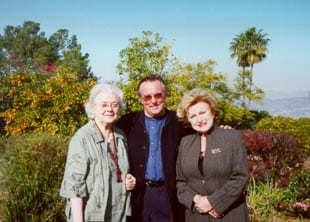
Bruzdowicz was the only Polish composer and the only woman selected to the final round of 12 composers who were invited to create a new Hymn for the Vatican. Her Stabat Mater written in 1993 for a special ceremony held at Forest Lawn Memorial in Glendale, California (unveiling in a restored theatre Jan Styka’s monumental panorama of the Crucifixion, commissioned by Paderewski) was attended by the representatives of the city and county, and the Polish government, among over one thousand of guests. This choral work is dedicated to PMC founder Wanda Wilk. In 2001 Bruzdowicz received the highest distinction from the Polish government—the Order of Polonia Restituta—for her contributions to Polish culture. Promoting Polish music is her passion and she has produced hours of radio programs devoted to this subject for radio stations in France, Germany, Belgium, Italy, Spain and the U.S.
Joanna Bruzdowicz also co-founded various musical organizations: Chopin-Szymanowski Association in Belgium, Jeunesses Musicales in Poland, GIMEP in France, andInternational Encounters in Music in Catalonia. Thanks to her efforts, numerous Polish composers received their first performances in Europe and the U.S. One of her most notable projects was a December 1985 concert held during the Year of European Music and devoted to the music from the “forgotten Europe.” The Belgium Radio Orchestra performed works by Szymanowski, Shostakovich, Dvorak and Bartók. A live recording from this concert was broadcast across Europe. Active as a founder and board member of the Polish section of Jeunesses Musicales, she is also founder and President of the Frederic Chopin and Karol Szymanowski Society of Belgium and Vice-President of the International Federation of Chopin Societies.
Manuscripts at USC
Alongside Witold Lutosławski and Stanisław Skrowaczewski, Joanna Bruzdowicz was one of the earliest donors to the PMC Manuscript Collection. Manuscripts of Trio dei Due Mondi for violin, cello and piano (1980), Tre Contre Tre for flute, oboe, viola and three percussions (1979), Concerto for Piano and Orchestra (1974), and Marlos Grosso Brasileiras “Chant d’amitié” for flute, violin, harpsichord and tape (1980) were included in the Manuscript Exhibition held at the PMC in October 2000.
The Music of Joanna Bruzdowicz
Essay by Dr. Maja Trochimczyk
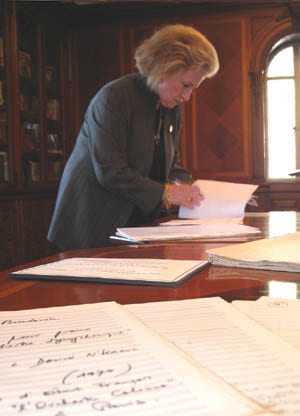
The roots of Joanna Bruzdowicz’s music can be located in the tradition of the colorful, lively and expressive neoclassicism of Grazyna Bacewicz (also a student of Kazimierz Sikorski in Warsaw and Nadia Boulanger in Paris), flavored by inspiration from the Polish school of sonorism (Penderecki, Lutoslawski). Her musical narratives are filled with kaleidoscopically shifting ideas and melodies; the moods alternate between somber reflection, sweet lyricism, and exuberant outbursts of joy. Her writing for strings is particularly idiomatic, with poignant monologues by soloists, especially the cello, transforming the instrument into an almost-human voice at the verge of signification. Bruzdowicz’s music is always meaningful, always associated with poetic or natural imagery, with ideas borrowed from classic literary texts or reflecting her personal fascinations. According to the eminent Polish music critic Tadeusz Kaczynski (Ruch Muzyczny, no. 13, 19 June 1988; p. 11), her works span “a range of moods, character, condensation of music material, dramaturgy, style and compositional technique.”
Bruzdowicz’s early international recognition stemmed primarily from her operas, The Penal Colony based on a story by Kafka (1972, rev. version 1986), The Women of Troy based on Eurypides’s play (1973, Polish version 1979), and The Gates of Paradise based on a historical novel by Jerzy Andrzejewski depicting the tragic story of the Children’s Crusade in the 13th century (1986). The operas feature similar dark, tragic subjects. The composer has explained her attraction to these themes in the following words: “I have been interested in subjects pertaining to the fate that people have prepared for themselves. . . I feel that the subject is highly pertinent because we are entering a new era of civilization in which there is less room for individuality, in which fanaticism is flourishing and in which the human being is being transformed into a robot. . . Today, I believe, one must speak out about the dangers that threaten us, we must strive to inspire the viewers and listeners to reflect about these issues.”
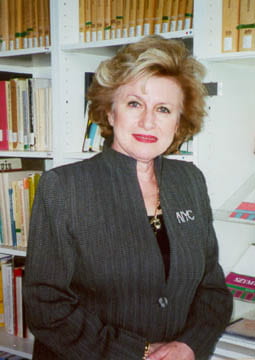
The second version of The Penal Colony was staged in 1986 in Liège, Belgium; the nightmarish imagery and horrid events in Kafka’s story found a faithful and equally disturbing interpretation in Bruzdowicz’s music, praised by an array of international music critics. Jacques Mairel in Le Soir (13 October 1986) noted her expressive use of Sprechgesang and electronic sounds for “reinforcing the expressionist climate and horror of the libretto with the electronics submersing us in atmospheres of false serenity or harsh horror.” German musicologist Detlef Gojowy (Die Welt, 11 October 1986) considered her “sound textures of perverse beauty” to be morally ambivalent in the setting of a story filled with such disturbing ideas and imagery, while praising her terse rhetoric blurring the borders between speech and song in the service of expression.
The composer adapted the text for The Gates of Paradise herself, shortening long statements and introducing actor-doubles for the singers in the six main roles (Monk, James, Alexis, Robert, Blanca, and Maud). The opera’s cast also included three acting roles, a chorus of adolescents, fourteen musicians, and a sound technician for the electronic tape. Detlef Gojowy, in a review in Neue Zeitschrift für Musik, called the 1988 performances of The Gates of Paradise the high point of the Opernwoche, praising Bruzdowicz’s perfect use of speech, song, electronics, and choreography in the staging of the tragedy of the Children’s Crusade. The composer explained her motivation to compose this opera, “dedicated to all the children of the world,” in the following words (in conversation with Ludwik Erhardt in Polish Music/Polnische Musik, 1986):
“In The Gates of Paradise, situated in the 13th century, the children who set out for Jerusalem to liberate the grave of Christ from pagan hands were actually condemned to death by starvation and exhaustion or to be enslaved by Turkish and Arab slave traders. . . in later centuries there was no lack of similar situations created for political, religious and social reasons. . . With so much evil in the world, with so many unresolved political, religious and social problems that carry the threat of war, of a new disaster, or at least the threat of revolution in many countries, I believe that we should all give our attention to the rearing of children and to the role children play in every society.”
With her social conscience, Bruzdowicz could have been easily seduced by a politically-correct or engaged approach to composing. She was protected from this danger by her musical talent, overflowing with melodic, textural, and rhythmic ideas. An influential French music critic and conductor, Antoine Golea, wrote an enthusiastic appreciation of her abilities (published in the Poland Magazine as “Originality But Not at any Price”), stating:
“I am firmly convinced hers is a genuine talent, strong, original and not striving for originality at any price. . . All of this is lucid and original, rich in genuine musical invention and, as the need arises, dramatic, but always constructed and developed in accordance with the principles of the real composers of all times, independent of fashion, solicitous of technical honesty and valuing what must still be called ‘inspiration.”
According to Golea, Bruzdowicz’s music has features of “classical modernity” and the emotional and formal balance of her works is coupled with melodious and engaging sound material.
These traits are especially prominent in her chamber music. Her Trio dei Due Mondi (1980) successfully juxtaposes European avant-garde gestures with South-American dance rhythms and elements of jazz. In her String Quartet No. 2 Cantus Aaeternus (1988) for an actor reciting text fragments from a wide range of poetry in several languages, and four string instruments, the layers of the music reflect Bruzdowicz’s talent for expressive textual settings and her experience with opera and film music. The Violin Sonata No. 2, subtitled Spring in America (1994), follows a neoclassical outline of three movements (Fast-Slow-Fast), while subdividing each of the movements into a series of musical moments of exquisite beauty. In the course of the work, the composer leads the listeners through ever-changing landscapes of sonorous textures, motives, and patterns.
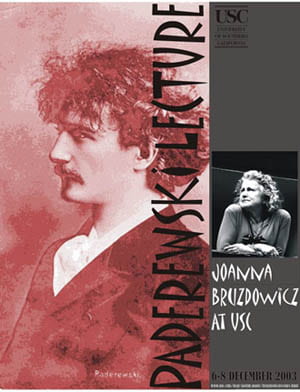
The composer’s fame also stems from her collaboration with the distinguished French film director, Agnès Varda, sometimes called the “Grandmother of the New Wave” of experimental and socially engaged cinema. The director’s approach to filmmaking may be summarized in her statement, “In my films, I always wanted to make people see deeply. I don’t want to show things, but to give people the desire to see.” According to film critic Pauline Kael, Varda “has consistently interspersed unique documentaries with an incredibly varied range of features, from neo-realism to surrealism, from giddy free-form improv to rigorous control, to hybrids that can only be called ‘Vardian.'” Several of the films that Bruzdowicz scored for Varda received international awards; the most notable titles are: Sans Toit, ni Loi (known in English as Vagabond, 1985), a fictional documentary about a female drifter, awarded a Golden Lion at the Venice Film Festival; Jacquot de Nantes (1991), selected for recognition by the Cannes Festival; and The Gleaners and I, a documentary and first-person video essay by Varda (2001), the winner of the best non-fiction film awards from the New York, Los Angeles and Boston film critics associations, the U.S. National Society of Film Critics (and over 40 international film awards). Bruzdowicz’s music for The Gleaners and I is elegant, discreet, and refined, highlighting the mood of quiet reflection about the vagaries of human life which permeates Varda’s inspiring documentary. In addition to working with Varda, Bruzdowicz has also scored films by Gilles Katz and Yves Angelo.
Bruzdowicz’s strong ties to California include the 1993 premiere of her cantata Stabat Mater for chorus a cappella at the unveiling of Jan Styka’s monumental panorama of the Crucifixion at the Forest Lawn Memorial in Glendale. The work was commissioned by the Polish Music Center and is dedicated to Mrs. Wanda Wilk. The composer donated manuscripts of two works to the PMC Manuscript Collection: Tre Contre Tre, for flute, oboe, viola and three percussionists (1979) and Trio dei Due Mondi, for violin, cello and piano (1980). She completed her donation and received the title of PMC Benefactor (value of donation exceeding $10,000), in December 2003, by presenting the PMC with two additional manuscripts of her Piano Concerto and Marlos Grosso Brasileiras.
SELECTED COMPOSITIONS
Theater Music (Opera, Ballet)
In der Strafkolonie [The Penal Colony; La Colonie Pénitentiaire], a one-act musical drama after Franz Kafka, 60′
Commissioned by the Opera of Prague, Narodni Divadlo in 1967
First performance: The Opera of Tours, France (1972)
Polish premiere: Teatr Wielki, Warszawa; Wrocław Opera (2008); Poznań (2010).
Ensemble: 1 baritone, 1 tenor, 2 actors, 3 mimes, symphony orchestra (for 45 or 19 musicians) plus 2 tapes
Publisher: CHOUDENS, Paris
New version for 1 baritone, 1 tenor, 2 actors, orchestra recorded on tape + electronic music on tape + wind quintet live
First performance: 9 October 1986, Le Petit Téâtre de l`Opéra Royal de Liège
Les Troyennes [The Women of Troy – Die Troerinnen], musical tragedy after Euripides, 80′
Commissioned by Centre Lyrique Populaire de France
First performance: Théâtre Gérard Philippe, Paris.
Ensemble: 2 sopranos, 1 mezzo, 1 baritone, 2 actors, choir of 12 singers, ensemble of 9 musicians plus 2 tapes
Publisher: CHOUDENS, Paris
First performance Trojanki (new Polish version): 20 July 1979, by the Grand Opera-National Theatre in Warsaw
Le Petit Prince, ballet after the book by Antoine De Saint-Exupéry in 28 scenes, 60′
First performance: Palais des Beaux-Arts, Brussels
Ensemble: 12 musicians and electronic music, mixed on one tape. Live-interpretation possible
The Gates of Paradise [Bramy Raju], musical drama after Jerzy Andrzejewski, 120′
Commissioned by Polish Ministry of Culture in 1987
First performance: November 1987, Grand Opera-National Theatre, Warsaw
Ensemble: 1 soprano, 1 mezzo-alto, 4 tenors, 2 baritones, 8 actors, 14 young singers (15-18 years old), 14 musicians plus one tape (electronic music)
Die Geschichte eines Neugierigen Vogels music theater with improvisation about electronic music (tape and media) with and for children (1976)
First performance: 1976, Versailles, France
Waiting for Anaïs [En attendant Anaïs], Musical for children. Story and poems by Myriam Fuks and Tamara Danblan, 80′
Commissioned by Théâtre Résidence Palace, Brussels
First performance: 6 December 1987 in Théâtre Résidence Palace
Ensemble: 2 singers (1 woman, 1 child), 3 dancers, 2 musicians (guitar and clarinet-saxophone) on the stage. Music on tape (2 guitars, 1 piano, 2 percussion, 1 double bass, 1 saxophone/clarinet)
Performed 187 times between 1987 and 1992
Tides and Waves (1991-1992), Opera-musical in two acts. Story by Jürgen Tittel and Joanna Bruzdowicz.
Libretto by J. Tittel, J. Bruzdowicz and Hermine Furest-Garcia 140′
Patron: UNESCO
First performance (excerpts): Paris and Barcelona, 1 June 1992; on board the warship Wodnik in Gdańsk-Westerplatte, 1997
Ensemble: 12 singers, chorus (singers/dancers) orchestra of 20 musicians able to play classic music and jazz
Orchestral Music
Impressions for 2 Pianos and Orchestra (fl + pic, ob, 2 cl, bsn, 2 h, 2 trp, trb, 3 perc, strings) (1966), 20′
First performance: 1969, Warsaw
Suite in Memoriam Sergei Prokofiev for orchestra (2 fl,2 ob, 2 cl, 2 bsn, 3 h, 2 trtp, trb, 2 perc, str, pf) (1966-67), 12′
First performance: 1967, Białystok
Eclairs for orchestra (2 fl, 2 ob-soloist, 2 bsn-soloist, 2 h, str) (1969), 8′
First performance: 1969, Bydgoszcz
Publisher: CHOUDENES, Paris
Jour d’ici et d’ailleurs for mixed choir, vocal quartet, 1 speaker and ensemble (cl, bsn, trp, trb, 2 pf, 2 perc) (1971), text by Paul Cornish-Miguel, 20′
First performance: 1975, Warsaw Philharmonic Orchestra, Jerzy Witkowski, conductor
Symphonie for orchestra (3 fl, 3 ob, 3 cl, 3 bsn, 4 h, 3 tr, 3 trb, tb, 4 perc, cel, pf, 8 I vl, 8 II vl, 8 vle, 8 vlc, 6 cb) (1975), 18′
Commissioned by Festival Printemps Musical de Paris
First performance: 30 April 1975, Paris, Orchestre de Paris, Mihai Brediceanu, conductor
Published by composer
Concerto for Piano and Orchestra (2 fl, 2 ob, 2 cl, 2 bsn, 4 h, 3 trp, 2 trb, tb, 4 perc, 8 I vl, 8 II vl, 8 vle 8 vlc, 6 cb, cel) (1974), 17′
Commissioned by Concerts Colonne
First performance: 23 February 1975, Paris, Orchestre Colonne, Désiré N’Kaoua, piano, Jean-Sebastian Bereau, conductor
Publisher: CHOUDENS, Paris
Concerto for Violin and Orchestra (3 fl, 3 ob, 3 cl, 2 bsn, 4 h, 2 trp, 2 trb, tb, hp, pf, 8 I vl, 8 II vl, 8 vle, 8 vlc, 6 cb, cel) (1975), 17′
Commissioned by Radio France
First performance: 11 February 1978, Orchestre Philharmonique de Radio France, Jean-Jacques Kantorow, violin, Alain Savouret, conductor
Publisher CHOUDENS-PWN, Paris/Kraków
Recording: “Bruzdowicz-Penderecki” CD PAVANE-OLYMPIA RECORDS Lódź Philharmony Orchestra Krzysztof Jakowicz, violin, Andrzej Markowski, conductor
Aquae sextiae, suite for wind instruments (soloists: 2 trp, 1 trb, 1 h, 1 tb; Ensemble 4 h, 3 trp, 4 trb, 2 bugles, 2 sax-b, 1 sax-cb) (1978), 10′
Commissioned by the Minister of Culture of France for Festival of Aix-en-Provence
First performance: 12 July 1978, Aix-en-Provence, Ensemble Ars Nova (Paris)
Concerto for Double Bass and Orchestra (3 fl, 3 ob, 3 cl, 3 bsn, 4 h, 3 trp, 3 trb, 1 tb, 4perc, cel, pf, 10 I vl, 8 II vl, 8 vle, 8 vlc, 6 cb) (1982), 18′
Commissioned by the Minister of Culture of France for Fernando Grillo
First performance: March 1984, Łódź, Fernando Grillo and Łódź Philharmonic Orchestra, Andrzej Markowski, conductor
Recording: “Bruzdowicz-Penderecki” CD PAVANE-OLYMPIA RECORDS. Live recording in Łódź, 1984
Publisher: CHOUDENS-PWN, Paris/Kraków
Four Seasons Greetings for string chamber orchestra and soloists (1988/89), 48′
I: Spring – two violins
II: Summer – Piano 4 hands
III: Autumn – Flute
IV: Winter – Marimba
First performance: 2 April 1989, Poznań
The Cry of the Phoenix Concerto for Cello and Symphony Orchestra (2 fl, 2 ob, 2 cl, 2 bsn, 4 h, 3 trp, 2 trb, 1tb, pf+hrp, 3 perc, 8 I vl, 8 II vl, 8 vle, 6 vcl, 6 cb) (1994), 22′
Dedicated to the 1944 Warsaw Uprising
First performance: 16 September 1994, Lublin, Poland, with Tomasz Strahl, cello
Symphony No. 2 – Concertino for Orchestra (2007)
First Performance: 20 April 2007, Katowice, Polish Radio National Symphony Orchestra, dir. Ruben Silva
Concertino for Piano and Orchestra (2010), 6′
Dedicated to Władysław Szpilman
First performance: Gdańsk, Poland, 9 July 2010, Wikipedia International Conference
Katarina Tereszczenko, piano; Felix Reolon, cond.; Gdańsk Symphony Orchestra
Lella – Oratorio Profane (2011), 55′
Libretto by Christiane Schapira
Ensemble: Mezzo-soprano, soprano, oboe, string quartet, percussion, female choir, speaker
First performance: Bastia, Corsica, France, 9 November 2011
Conductor: Joanna Bruzdowicz with musicians from Corsica
Chamber Music
Wind Quintet (1966), 12′
First performance: 1966, Warsaw
Per Due for violin and piano (1966), 10′
First performance: 1966, Warsaw
Epigrams for solo violin (1966), 7′
First performance: 1966, Warsaw
Publisher: PWM, Poland
Recording: CD – Pavane Records, ADW 7266; Robert Szreder, violin
Erotiques for solo piano (1966), 7′
First performance: 1966, Warsaw
Publisher: Salabert, Paris
Recordings: “International Festival of the 20th Century” Nelson Delle Vigni Fabbri, piano PAVANE ADW 7052-23
CD – Pavane Records, ADW 7287 DDD; Carol Honigberg, piano
Niobe for speaker soprano and ensemble (fl, cl, vl, perc, pf), texts by Konstanty Ildefons Gałczyński (1966), 15′
First performance: 1966, Warsaw
Sketches from the Harbour for mezzo-soprano and ensemble (fl, pf, 3 perc.) texts byJ osé Gorostiza (1967), 20′
First performance: 1967, Warsaw
Prize of Polish Composers Union
Publisher: PWM, Poland
Esquisses for flute, viola, cello and piano (1969), 10′
First performance: 1969, Valbella, Switzerland, International Festival of Lenzerhide
Stigma for solo cello (1969), 10′
First performance: December 1970, Paris
Publisher: SALABERT
Pehnidi for solo harpsichord (1970), 7′
First performance: 1971, Paris
Mater Polonica for organ solo (1973), 10′
First performance: 1974, Paris, Notre-Dame de Paris
Publisher: CHOUDENS, Paris
Esitanza for two pianos four hands (1973), 7′
First performance: 1973, Paris
Publisher: CHOUDENS, Paris
Episode for piano and 13 strings (7 vl, 4 vle, 2 vcl) (1973), 8′
First performance: 1973, France, Festival de La Sainte-Baume
Publisher: CHOUDENS, Paris
A Claire Voix for mixed choir and 4 instruments (3 wind-free choice and piano) + tape, text by J. F. Tetard (1973), 12′
First performance: 1973, Vichy, France
Publisher: CHOUDENS, Paris
Epitaphe for harpsichord and tape (1972/73), 12′
Commissioned by Elżbieta Chojnacka
First performance: 1973, Vienna, Austria
Publisher: CHOUDENS, Paris
An der Schönen Blauen Donau for two pianos and tape (1973/74), 10′
First performance: 1974, Brahms Saal, Musikverein, Vienna
Publisher: CHOUDENS, Paris
Ette for clarinet solo (1974), 8′
First performance: 1976, Festival of Częstochowa
Einklang for harpsichord and organ (1975), 10′
Commissioned by Festival of Royan
First performance: 1975, Royan
Publisher: CHOUDENS, Paris
Trio for variable instrumentation: 1. mezzo-soprano or baritone, cello and piano; 2. 6 musicians (free choice); 3. 9 musicians (free choice) (1975)
Commissioned by Jean-Pierre Armengaud
First performance: 1975, Festival de Sainte-Baume
Equivocita musical game for clavichord (1978), 8′
Commissioned by Annette Sachs
First performance: 1978, Antwerp
October Sonata for piano In memoriam 16. X. 1978, Election of Pope John-Paul II (1978), 15′
First performance: 1979, Stockholm, Sweden
Publisher: TONOS, Darmstadt, Germany
Recordings: “Messiaen-Bruzdowicz” Aquiles Delle Vigne, piano
PAVANE ADW 7054
CD – Pavane Records, ADW 7287 DDD; Carol Honigberg, piano
Fantasia Hermantica on Thema S’A’B’B’E for viola and piano (1979)
First performance, Brussels, 1979
Tre Contre Tre for flute, oboe, viola and 3 percussion (1979), 10′
Commissioned by ensemble “2E 2M” of Paul Mefano, France
First performance: 1979, Rome
Marlos Grosso Brasileiros “Chant d’amitié” for flute, violin, harpsichord and tape (1980), 12′
Commissioned by “Trio Baroque”, Brussels
First performance: 1980, Brussels
Recording: “Trio Baroque” PAVANE ADW 7035
Trio dei Due Mondi for violin, cello and piano (1980), 17′
Commissioned by Radio France and “Trio Europeén”, Brussels
First performance: January 1981, Radio France, Paris
Publisher: AA-WARSAW
Recordings: “XX’ Century Music + E. Johnston and Grete von Zieritz by Mark Foster Trio MARCUS 308329 -EMI ELECTROLA
CD – Pavane Records, ADW 7355; R. Szreder, B. J. Strobel, T. Strahl
Para y Contra for double-bass and tape (1981), 8′
Commissioned by Rafael Gonzales de Lara
First performance: September 1981, Brussels
Prélude et Fuge for harpsichord (1980), 4′
First performance: 1980, Paris
Publisher: CARROUSEL, Rideau Rouge
Trio per Trio for flute, violin and harpsichord (1981), 10′
Suita di Danze: “Polonese d’Agosto”, “Tango Barocco”, “Valse Lugubre” Commissioned by “Trio Baroque”, Brussels
First performance: 15 September 1981, Brussels, Festival de Flandre
Dreams and Drums for one percussion player (1982), 8′
Commissioned by Marta Ptaszyńska
First performance: March 1982, Santa Barbara
Oracle for bassoon and tape (1982), 8′
Commissioned by Alexandre Ouzounoff
First performance: March 1983, Paris
String Quartet No. 1, “La Vita” (1983), 15′
Commissioned by Varsovia String Quartet
First performance: April 1983, Brussels
Publisher: CHOUDENS, Paris
Recordings: “Lutosławski, Penderecki, Bruzdowicz” PAVANE ADW 7149 by “Varsovia String Quartet”
[Great Record Prize in France: “Diapason d’Or” 1984]
CD – Pavane Records, ADW 7218; Varsovia String Quartet
Ubi et Orbi cantata for tenor, children’s choir, two trumpets, two trombones, organ, with poems of Hubertus Hess and Jürgen Tittel (1985), 15′
Commissioned by Sillenburgischer Stuttgart Konzerte
First performance: 23 June 1985, Stuttgart
Publisher: TONOS, Darmstadt
String Quartet No. 2, “Cantus Aeternus” (1988), 14′
Commissioned by Varsovia String Quartet and Warsaw Philharmonic with speaker. Poems by H. Miller, Cz. Miłosz, I. Bachmann, P. Eluard, J. Valverde, K. Gałczyński, K. Baczyński
First performance: 10 May 1988, Warsaw
Publisher: CHOUDENS, Paris
Recording: “Zarębski-Bruzdowicz”, CD PAVANE-RECORDS, ADW 7218
Aurora Borealis for harp and organ (1988), 8′
Commissioned by Bergen Festival
First performance: 22 May 1988, Bergen
La Espero cantata for soprano, baritone, harpsichord, 2 vl, 1 vla, 2 vcl, 1 cb to text by Ludwik Zamenhof (1989), 10′
Commissioned by Medecins du Monde for their international congress in Kraków
First performance: 25 March 1990, Kraków
Violin Sonata No. 1, “Il Ritorno” for violin solo (1990), 18′
Commissioned by Euphonia European Broadcasting Union
First performance: 25 April 1990, Zagreb
Recording: CD – Pavane Records, ADW 7266; Robert Szreder, violin
On Prayer for soprano and piano (1990), 7′
Commissioned by WFMT-Chicago’s Fine Arts Radio Station
First performance: 21 November 1990, WFMT, Chicago
Je me souviens for marimba solo (1990), 10′
Commissioned by Marie-Josée Simard
First performance: 17 December 1990, Montreal
Stabat Mater for choir a cappella (1993), 12′
Commissioned by Polish Music Center, USC, Los Angeles
First performance: 3 April 1993, Los Angeles
Spring in America Sonata for violin and piano (1994), 21′
Commissioned by Robert Szreder and Bogusław Strobel for their Lincoln Center Recital, New York
First performance: 20 April 1994, New York
Recording: CD – Pavane Records, ADW 7355
Word five songs for soprano and piano to the poetry by Czesław Miłosz (1995-96), 20′
First performance: 18 May 1996, Chicago
Song of Hope and Love for cello and piano (1997), 14′
Commissioned by Stephen and Carol Hoinberg for a Holocaust Memorial Museum, Washington, DC concert
First performance: 22 June 1997, Washington, DC
Symphonie for two guitars, percussion and string quintet or chamber orchestra (1997), 40′
Commissioned by Valerie Duchateau and Juan Carmona
First performance: January 1998
Ave Maria for contralto and organ (2007)
Commissioned by Catherine Dagois and Edgar Teufel
First performance: July 2007, Perpignan
Toccata for solo organ (2007)
Commissioned by Edgar Teufel
First performance: May 2007, Stuttgart
From the Fever World six songs for mezzo-soprano and piano and string quartet (2012)
Poetry by Jehanne Dubrow
First performance: 13 May 2012, Chicago
Electroacoustic Music
Ek-Stasis (1969), 15′
Electroacoustic music for kinetic environment of Constantin Xenakis with participation of mimes
Co-composed with Elzbieta Sikora
First performance: 1969, Paris
Phobos (1969), 8′
Co-composed with Elzbieta Sikora
First performance: 1969, Paris
Salto for percussion and tape (1970), 9′
First performance: 1970, Paris
Fas en Nefas for guitar and tape (1970), 8′
First performance: 1970, Paris
Le Danger (1970), 6′
Composed for the exhibition of Victor Cupsa, Museum of Modern Art, Paris
First performance: 1970, Paris
Homo Faber electronic trilogy, dedicated to Max Frish (1971-75), 28’
I. “Le Souffle” [Breath] for Alexander Soljenitsyne, 8′
First performance: 1972, Paris
II. “La Solitude” [Solitude] (in memoriam Charles Baudelaire), 10′
First performance Festival of Royan, France, 1972
III. “La Sérénité” [Serenity] to a poem by Paul Valery for Horst-Jürgen Tittel, 10′
First performance: 1975, Gent, Belgium
Recording: “Bruzdowicz-Bogaert” PAVANE ADW7064
Inner Space – Outer Space (1978), 36′
First performance: 1979, BRT Radio, Belgium
Bartokalia (1979), 12′
First performance: 1980, Brussels
Neue Kinderszenen electronic suite for children (1980)
I. “And they came all by train; Zorro, Mickey Mouse, Ali Baba….”
II. “One clever Bird and singing Bird”
III. “Barrel Organ and her monkey
First performance: BRT Radio, Belgium, 1980
Film and Theater Music
Le Hussard sur le toit (1969) TV film, dir. J. Lipchitz
Objets à Réflexion (1969) short film about painter C. Xenakis, dir. Berndt Nyberg
La Mort de Lord Chatterley (1972) TV film, dir. Gilles Katz
Les Cyclopes (1973) Broadcasting Theater, France
Chita je t’aime (1973) TV film, dir. Gilles Katz
Le Forêt d’Orléans (1976) TV film, dir. Gilles Katz
Aussagen nach einer Verhaftung (1978) ZDF TV film Germany, dir. G. Moorse
A propos de la neige fondue (1979) feature film, dir. Gilles Katz
Tante Blandine (1982) TV film A2, dir. Guy Jorré
Islande (1982) short film, dir. Patrik Moors
Un échec de Maigret (1985) French TV A2 film, dir. Gilles Katz
Sans Toit, ni Loi (1985) feature film, France, dir. Agnès Varda
Stahlkammer Zürich 36 TV-series for Bavaria TV, Germany (1985-91). Script by Joanna Bruzdowicz and Horst-Jürgen Tittel
Le Jupon Rouge (1987) feature film, dir. Geneviéve Lefebre
Les Cinq Dernières minutes – Dernier grand prix (1987) feature film, dir. Gilles Katz
Kung Fu Master (1988) feature film, dir. Agnès Varda
Jane B. by Agnès V. (1988) feature film, dir. Agnès Varda
Jeumont, 51 Minutes d’arrêt (Enquête du Commissaire Maigret) (1988/89) TV film, dir. Gilles Katz
Jacquot de Nantes (1991) feature film, dir. Agnès Varda
C’est l’homme que j’ai tué (1994) TV film, dir. Giorgio Ferrara
Les Grandes Dames du Strip-tease (1994) feature film, dir. Françoise Levie
Un Air si pur (1997) feature film, dir. Yves Angelo
Les Glaneurs et la glaneuse [The Gleaners and I] (2001) documentary, dir. Agnès Varda
Two Years Later (2003) documentary, dir. Agnès Varda
Les Ames Grises [Grey Souls] (2006), feature film, dir. Yves Angelo
Entrepreneur (2006), documentary, dir. Jonathan Bricklin
Testudo (2007), short, dir. Jörg Tittel
Les Plages d’Agnès [The Beaches of Agnes] (2008) dir. Agnès Varda
J’ai oublié de te dire [I Forgot to Tell You] (2009) feature film, dir. Laurent Vinas-Raymond
Battle for Britain (2010) short, dir. Alex Helfrecht, written by Jörg Tittel
Gilbert Planche (2010) documentary, dir. Giorgio Treves
De ci de la Agnès (2011) 6 French TV films for Canal Plus, dir. Agnès Varda
Links
2003 Paderewski Lecture
Culture Page
Page updated on 11 January 2022